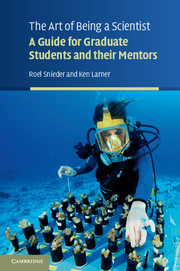Book contents
- Frontmatter
- Contents
- 1 Introduction
- 2 What is science?
- 3 Choices, choices, choices
- 4 The adviser and thesis committee
- 5 Questions drive research
- 6 Giving direction to our work
- 7 Turning challenges into opportunities
- 8 Ethics of research
- 9 Using the scientific literature
- 10 Communication
- 11 Publishing a paper
- 12 Time management
- 13 Writing proposals
- 14 The scientific career
- 15 Applying for a job
- 16 Concluding remarks
- Appendix A Further reading
- Appendix B A sample curriculum
- Appendix C The Refer and BibTeX format
- References
- About the authors
- Index
3 - Choices, choices, choices
Published online by Cambridge University Press: 05 June 2014
- Frontmatter
- Contents
- 1 Introduction
- 2 What is science?
- 3 Choices, choices, choices
- 4 The adviser and thesis committee
- 5 Questions drive research
- 6 Giving direction to our work
- 7 Turning challenges into opportunities
- 8 Ethics of research
- 9 Using the scientific literature
- 10 Communication
- 11 Publishing a paper
- 12 Time management
- 13 Writing proposals
- 14 The scientific career
- 15 Applying for a job
- 16 Concluding remarks
- Appendix A Further reading
- Appendix B A sample curriculum
- Appendix C The Refer and BibTeX format
- References
- About the authors
- Index
Summary
Any student contemplating graduate study, or embarking on graduate study or a career in science, is confronted by a myriad of choices. During your undergraduate career, you have the choices of major and minor subject, but you're likely past having made decisions on those. Once you have decided to pursue graduate study, near the end of your undergraduate study comes your choice of graduate university and program, founded on the choice of field – and, perhaps, subfield – of study you wish to pursue or type of career you wish to follow. Once beyond these choices, or perhaps concurrent with them, comes an all-important one, your choice of adviser – the individual who likely will have the largest influence on your approach to and outlook on science as well as on your success throughout the time of graduate study. An abundance of choices, many of which are puzzling and difficult to make, but what a wonderful position to be in to have created for yourself the opportunity to face such difficulties.
In planning research it is usually not hard to decide broadly what we want to achieve. The goal of the research might be to pursue an interest or a desire “to know”; it might be to find the path in which to establish a career; it might be to obtain a higher degree; it could be driven by the wish to contribute to making our world a better place in which to live; and it could be a mix of such considerations.
- Type
- Chapter
- Information
- The Art of Being a ScientistA Guide for Graduate Students and their Mentors, pp. 29 - 52Publisher: Cambridge University PressPrint publication year: 2009



